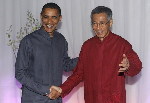
Singapore's Prime Minister Lee Hsien Loong (R) shakes hands with US President Barack Obama before the APEC Leaders Dinner at their summit in Singapore November 14, 2009. [Agencies]
SINGAPORE: A major pact within tantalizing reach, President Barack Obama aims to nudge forward an arms-control deal in talks with Russian President Dmitry Medvedev.
|
 Singapore's Prime Minister Lee Hsien Loong (R) shakes hands with US President Barack Obama before the APEC Leaders Dinner at their summit in Singapore November 14, 2009. [Agencies] |
The 21-member Asia-Pacific Economic Cooperation forum brought Obama to Singapore, but he is focusing on individual meetings Sunday with Medvedev and with Indonesia's Susilo Bambang Yudhoyono, president of the world's largest Muslim nation and Obama's home as a boy. The US-Russia meeting takes place as the nations seek a successor to a Cold War-era agreement.
Obama planned another milestone: joining a larger meeting that includes the leader of military-ruled Myanmar. Obama is sure to face criticism at home, particularly from conservatives, for doing so - a significant step up in his administration's new policy of "pragmatic engagement" that is a shift from years of US isolation and sanctions.
The leaders at the APEC forum also planned an informal breakfast meeting, organized by Australian Prime Minister Kevin Rudd and Mexican President Felipe Calderon, to discuss the progress of negotiations on a climate change agreement. The prime minister of Denmark, Lars Loekke Rasmussen, the chairman of next month's UN climate conference in Copenhagen, was expected to attend.
US officials say that the two nations now have agreed on the broad outlines of a new treaty, with the expectation that the leaders will sign one during Obama's travels to Europe in early December to accept the Nobel Peace Prize.
Such an agreement would be a big feather in Obama's cap and bragging rights toward his promise to work toward a nuclear-free world, offering momentum for other arms-control and nonproliferation efforts. The president has been hinting at his optimism on the issue leading up to and during his Asia trip.
"We are already taking steps to bring down our nuclear stockpiles in cooperation with the Russian government," he said during a news conference in Japan with Prime Minister Yukio Hatoyama.
A new treaty also could boost relations with Russia at a time that Washington is looking for its cooperation on issues including reining in Iran's nuclear ambitions.
Negotiators already have worked through a number of contentious issues and agreed on the number of warheads, the number of delivery systems and what will count as a delivery system, officials said.
The remaining issues in negotiations involve procedures for the two countries to verify that the other side is meeting the terms of the treaty, two administration officials said speaking on condition of anonymity because of the sensitivity of the negotiations.
"I don't foresee a major problem that can't be resolved within the next four weeks," said Daryl Kimball, executive director of the Arms Control Association, which follows the negotiations. "Neither side wants to go without a new agreement for very long."
Ben Rhodes, deputy national security adviser to Obama, suggested it wasn't likely the leaders would announce a breakthrough but that holding talks at such a high level while they are going on could help bring one about.
The existing START treaty, signed by Soviet President Mikhail Gorbachev and President George H.W. Bush in 1991, led each country to cut its nuclear warheads by at least one-quarter, to about 6,000. In 2002, Presidents Vladimir Putin and George W. Bush signed the Treaty of Moscow, which specified further cuts to between 1,700 and 2,200 operationally deployed warheads by 2012.
The US now has about 2,200 such warheads deployed, compared to about 2,800 for the Russians.
Once a deal is signed, it still would need ratification by the Russian Duma and the US Senate to take effect.